A Quick Tour of Magic Homages
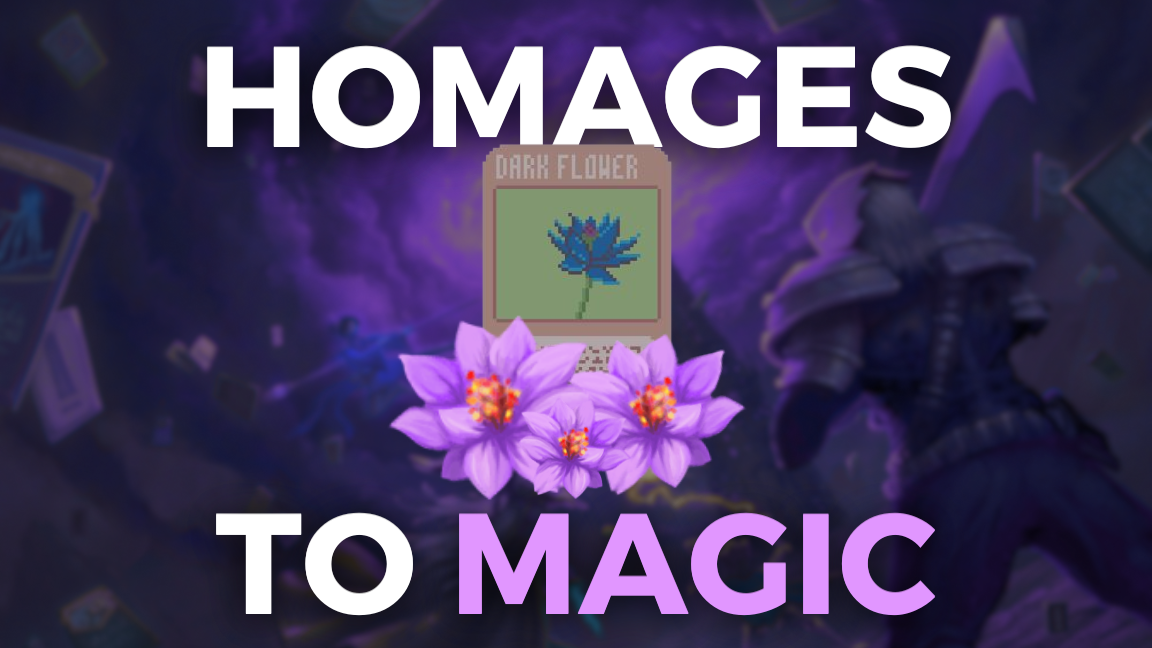
I know this world, from canopy to roots
It's been nearly four years since the first Universes Beyond cards were unleashed unto an unsuspecting Magic world.
That first release was The Walking Dead, in October of 2020, a Secret Lair that wasn't considered UB at the time but has since been grandfathered in under that sub-brand. It also came with its fair share of controversy.
The concept behind Universes Beyond is a simple one: what if non-Magic characters and settings were represented on Magic cards? The entire conceit of guest intellectual properties (IPs) appearing as Magic cards certainly garners strong reaction, both positively and negatively. In the 46 months since The Walking Dead shambled into our hearts, it's likely that you have also developed one of these strong opinions.
Since October of 2020, we've seen many IPs cross over to Magic, so many that a full list reads like the contents of a Funko Pop! clearance rack at your local Gamestop:
- The Walking Dead
- Stranger Things
- Arcane
- Street Fighter
- Warhammer 40,000
- Transformers
- Dungeons & Dragons
- The Lord of the Rings
- Creepshow
- Doctor Who
- Evil Dead
- The Princess Bride
- Jurassic Park
- Tomb Raider
- Clue
- Fallout
- Hatsune Miku
- Assassin's Creed
- Monty Python
And there are two more confirmed for 2025 in Final Fantasy and the big one, Marvel. There have also been a few guest appearances that aren't technically UB, but are more UB-adjacent. Those are My Little Pony, Dracula, Godzilla, and Cowboy Bebop.
This is all a preamble to the real meat of today's topic. As mentioned, we all have opinions on Universes Beyond, and the idea that outside IPs can phase into our Magic reality at any time, at the (Secret Lair) drop of a hat, well, it can be hard to get comfortable sometimes. Literally any day you wake up, you could be waking up to a reveal of a never-before-seen card.
But it's not a unique concept. Things cross over into other things all the time. Where do you think peanut butter and jelly sandwiches come from? And as Magic players, we're obviously most vigilant about the sanctity of our own game, but what if it was Magic that invaded other games? Did you ever think of that? Sure, there are the "official" crossovers, some of which we've talked about several months ago. But there are also the homages.
You see, Magic's an old game now, and a lot can happen in 30 years. A lot of people who grew up playing Magic are now adults who are in positions to influence others. Sometimes that's good, and sometimes that's not so good. Some of those adults have gone on to make their own games, and would kill to have Magic invade their world a la Universes Beyond, and if Hasbro's not willing to share their IP with others in the same way they covet others' IP, then we'll find out how close we can get to the copyright infringement line without going over.
It's happened plenty. Enough that we can make a handy-dandy list about it. And this is by no means definitive, since I have not played every video game ever to have discovered every Magic nod. But I've played a few.
Fallout
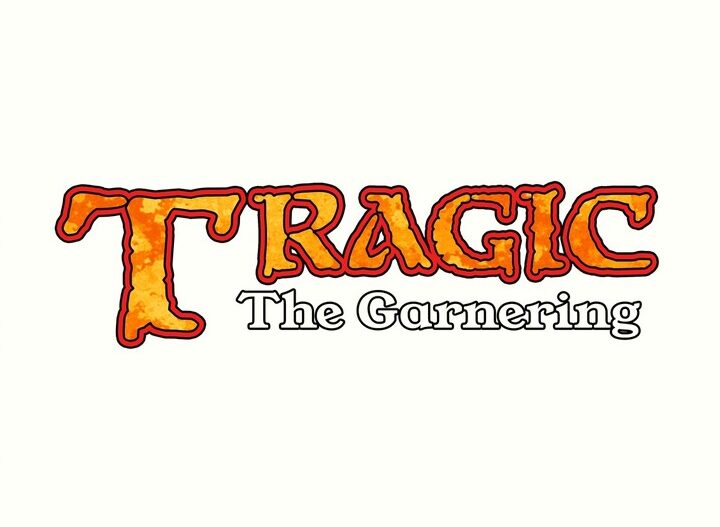
It was very fitting that Fallout ended up as a Universes Beyond crossover, because Magic's influence on its developers was evident since Fallout 2 was released way back in 1998.
If you're of a certain age, you may remember wandering the wastes of California, picking through every container for loot and occasionally coming across "Tragic the Garnering" cards. Obviously the similarity to Magic was no coincidence. In Fallout canon, Tragic can be played by two or three players (unless it is a Thursday), each using a deck of special cards called "Tragic cards" of the "Tragic the Garnering" set. In the game, the players are engaged in a battle and each start with twenty "life points." If the players life points reach zero or below, the player loses. Players lose life when they are dealt "damage" by being attacked with summoned creatures, spells, or other cards that cause them to lose life directly as stated on said cards. Also, a player can lose the game if they run out of cards to play.
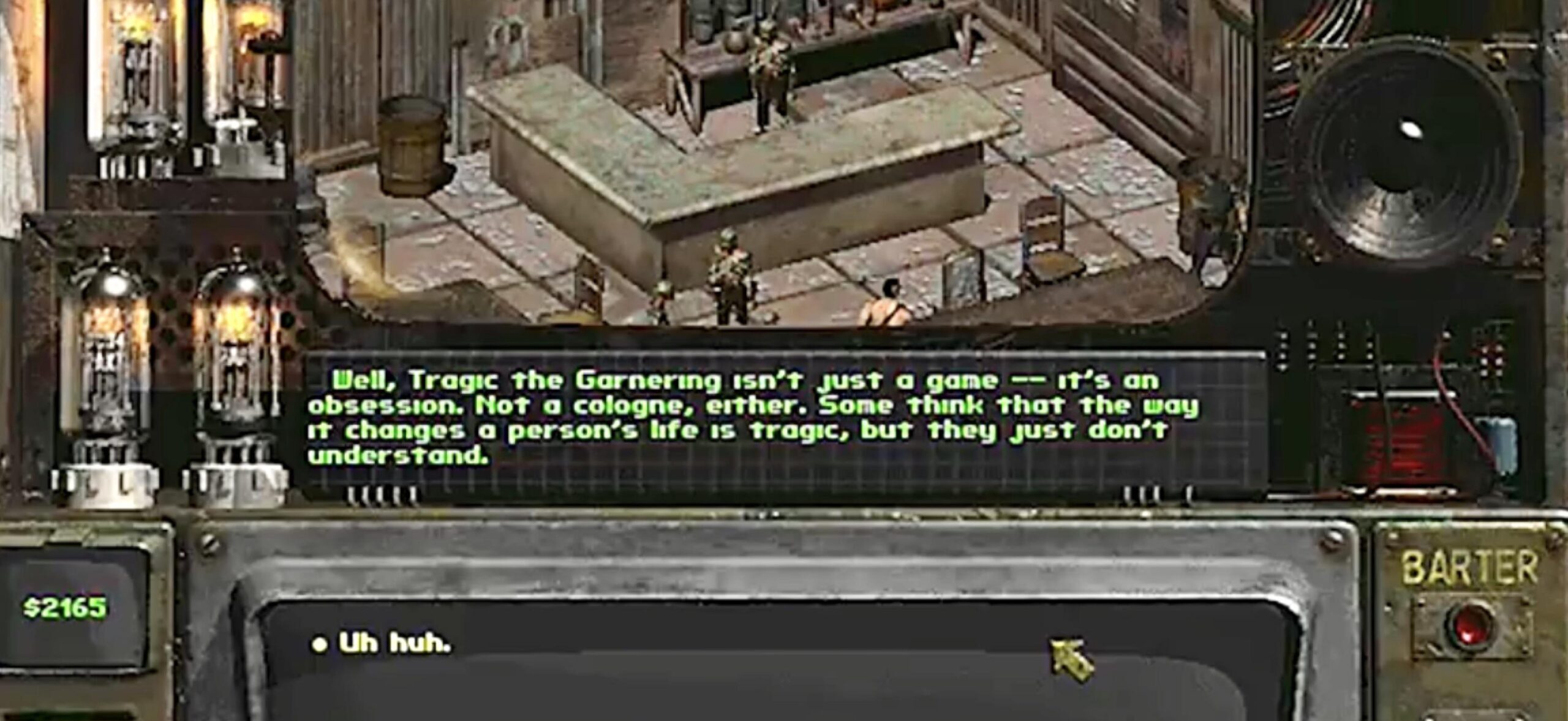
There's an NPC with whom your player character can play Tragic, though winning or losing is determined by a roll of dice influenced by your character's gambling skill. Some cards you might find are "Vox Muby," "Black Dahlia," and various "Earths" which are simply spoofs on lands. The game is also considered a life-damaging obsession for those who play it, a concept that is not rooted in reality whatsoever.
The Binding of Isaac
Created by Edmund McMillen and released in 2011, The Binding of Isaac is a roguelike adventure game inspired by the Biblical story of the same name. A remake, The Binding of Isaac: Rebirth, was released three years later to massive sucess.
McMillen's 44 years old, so it's no surprise that when developing the game, he could have been influenced by Magic. And that influence is evident in his game. There are several items in The Binding of Isaac that are direct references to specific Magic cards, like "Chaos Card
Of course, it's not just Magic cards that have seeped there way into the world of Isaac. The game's packed with references and the player can also find cards from Monopoly, Cards Against Humanity, and Uno in the dungeons of Isaac's basement.
McMillen was able to pay homage to Magic in another way shortly after The Binding of Isaac was released. As part of Core Set 2015's "Guest Designer" gimmick, McMillen's card, Cruel Sadist
Cards Against Humanity
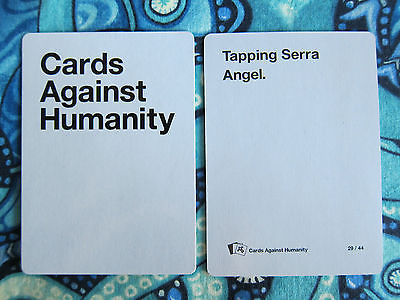
Speaking of Cards Against Humanity, or more specifically the "Geek Pack" expansion for the base game, there's a reference to Magic. In that expansion, which was a PAX exclusive 44-card pack released in 2013 featuring myriad crude and lewd references to various "nerdy" products, there was a card that simply read: "Tapping Serra Angel."
We all know that Serra Angel
As for Cards Against Humanity, it's described as an "adult party game" that I have been told is fun, but I've never seen evidence of that myself.
Defense of the Ancients 2
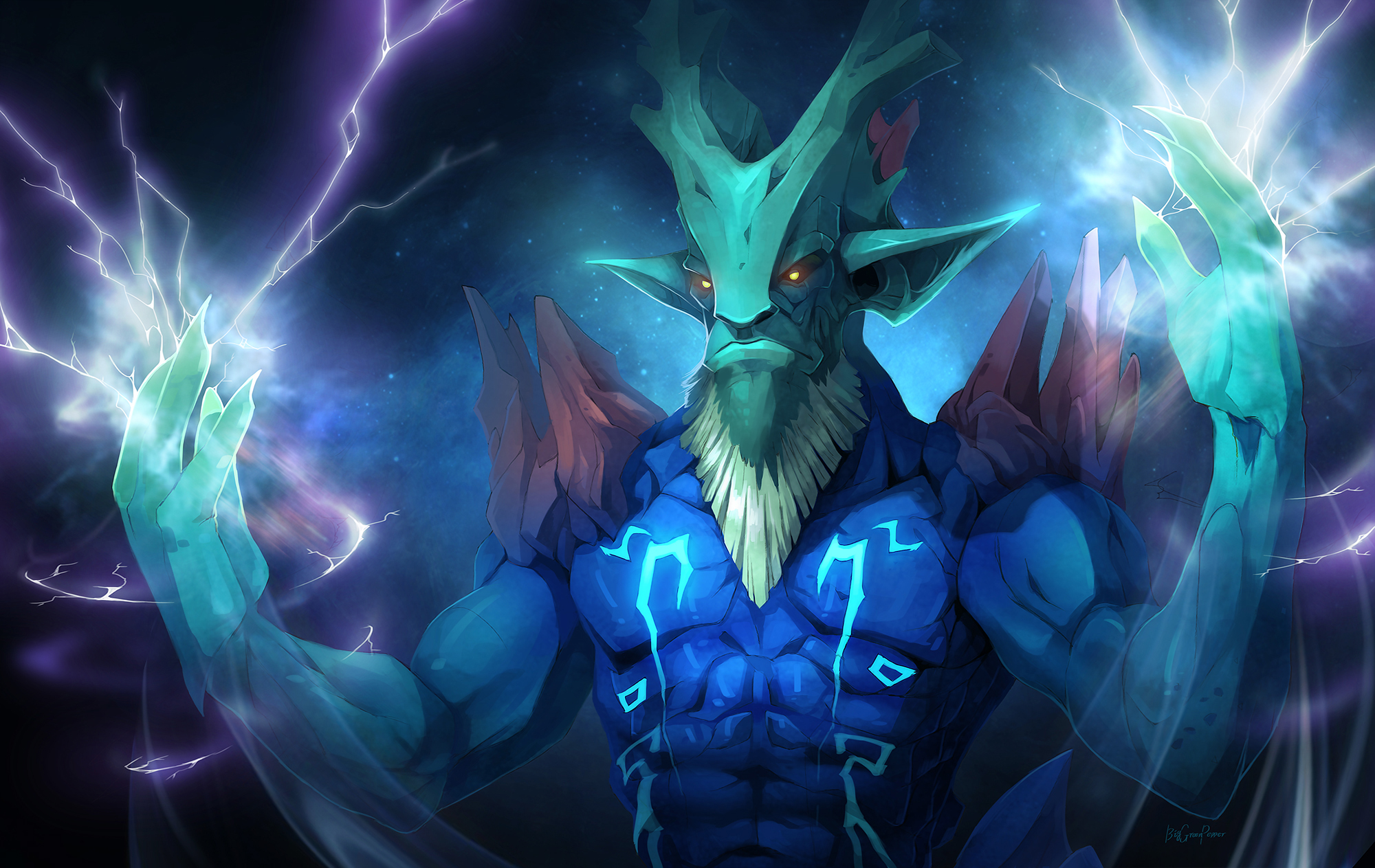
I'm old enough to remember when Defense of the Ancients, or DotA, was simply a mod for Warcraft III: Reign of Chaos. That was around 2002, and I played it plenty with friends. I was terrible at it, and I've only gotten worse.
DotA is what the cool kids call a "multiplayer online battle arena" which is just a fancy way of saying "that thing that League of Legends also is."
Magic players firing up DotA 2 for the first time might be surprised at the several references to our favorite card game, most glaringly in the form of one of its playable characters, Leshrac. In Magic, Leshrac's one of the original planeswalkers from before The Mending, an evil bastard who teamed up with other noted baddies from the era Tevesh Szat and Lim-Dul. Later, Leshrac almost killed Nicol Bolas, but things didn't end very well.
Strangely, we've never gotten a Leshrac card, though the name has appeared on a few, including Herald of Leshrac
Fans of DotA 2 probably don't know nor care about any of that. They only know that their version of Leshrac also has the ability to cast a spell called "Diabolic Edict
So no, it's not coincidence.
Dungeons and Degenerate Gamblers
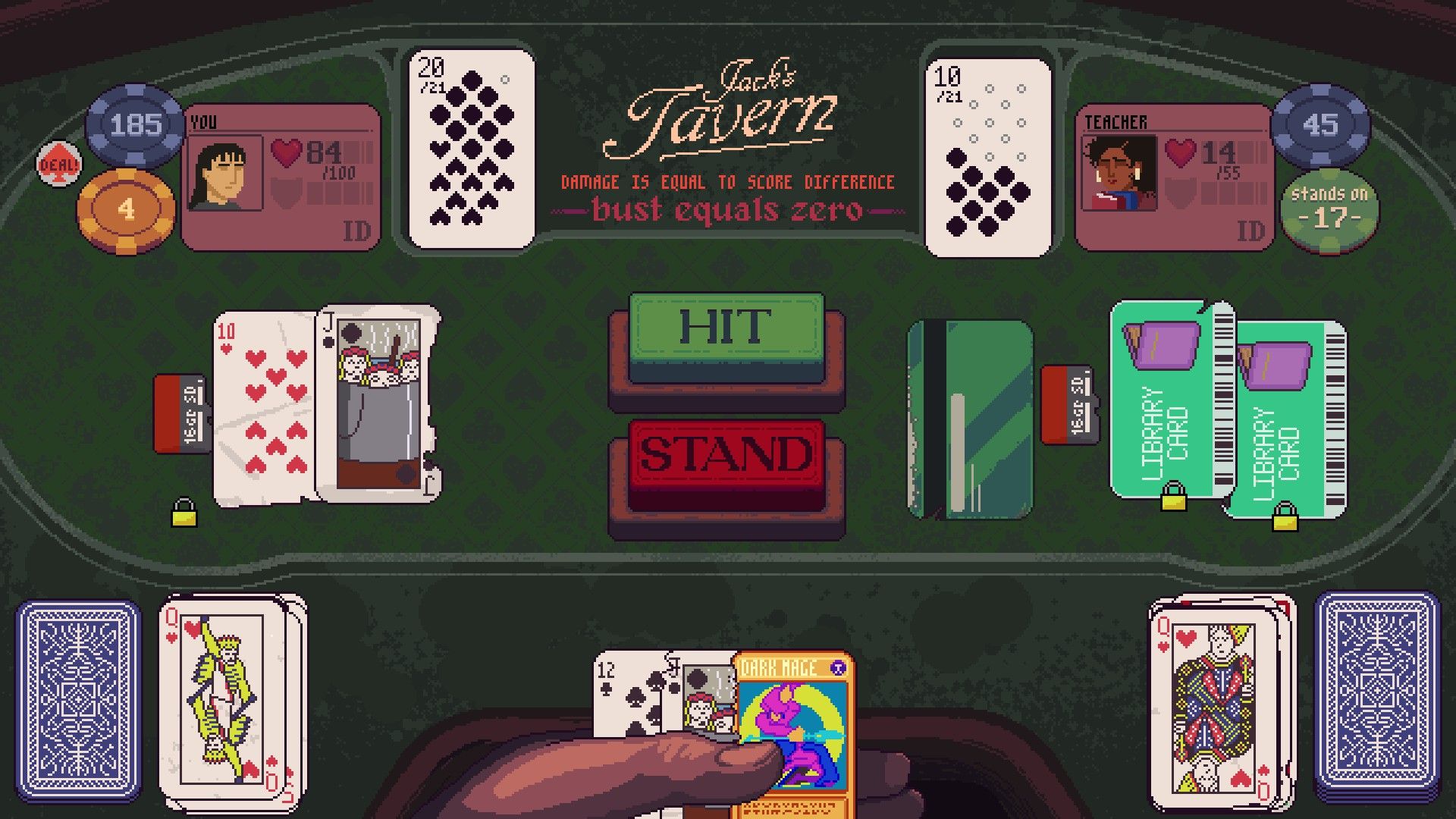
This one's very new, but there's no mistaking the many references to outside card-based games.
Released on August 8 but playable in various stages of development for several months, Dungeons & Degenerate Gamblers aims to do for Blackjack what Balatro did for Poker. If that sounds interesting to you, you'll love it. If you didn't care for Balatro, then you should probably skip this one.
Like Balatro, the definition of "card" is stretched to its limit in D&DG, with your deck quickly filling up with all manner of card-like things including tarot cards, business cards, blood donor cards, Geralt of Riviera. There's a lot. There are also references to Pokemon, YuGiOh!, and of course, Magic. And if you're going to reference Magic, you might as well go big.
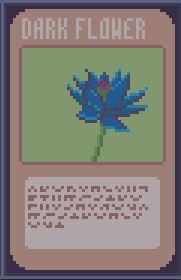
It's actually pretty useful in the game, too.
Slay the Spire
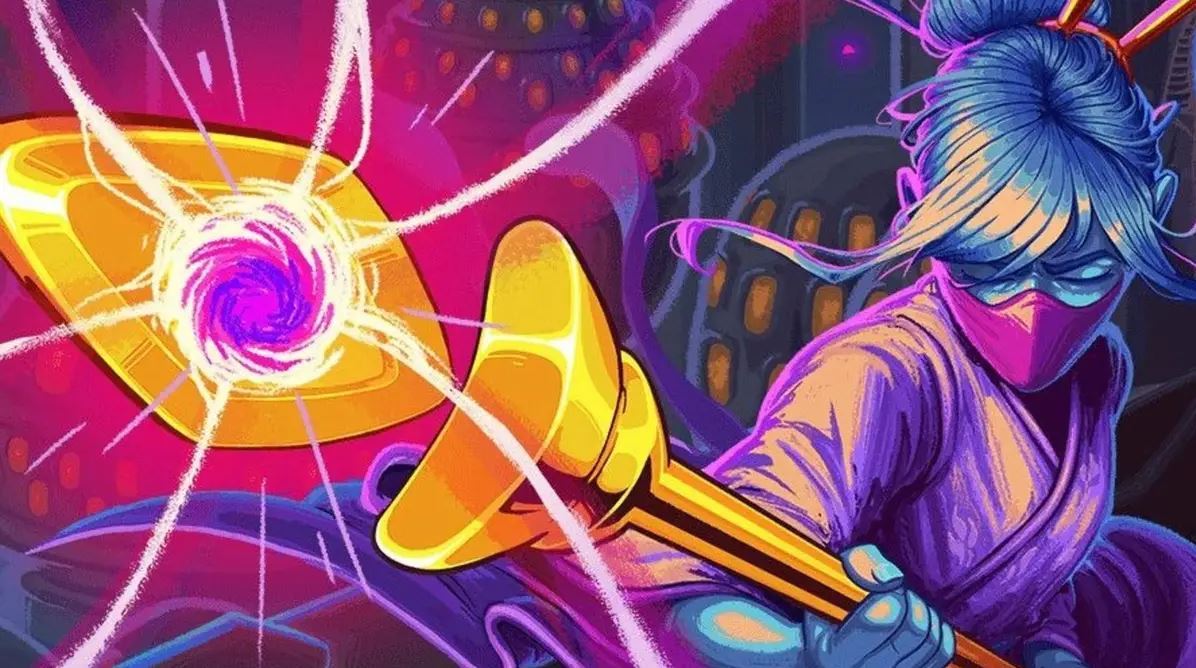
Magic: The Gathering and Slay the Spire share more than just Bruce Brenneise in common.
There's also a confirmed reference to Magic locked within the Spire, and like our previous entry, it's a reference to Black Lotus. In Slay the Spire's case, that comes in the form of the relic "Violet Lotus."
In StS, The Violet Lotus provides energy to the player, which as you might surmise is essentially mana. It's also really good. Slay the Spire has become so dominating as an entry into the roguelike deckbuilding genre that we could easily be writing another article about StS references in other games, and if one day soon Wizards announced that we'd be getting a Slay the Spire Secret Lair, I wouldn't bat an eye. I probably wouldn't buy it unless it had Claw, though.
It isn't just a game, it's an obsession
Like mentioned already, this is by no means an exhaustive list of homages to Magic in other games. It's probably only scratching the surface. Hit me in the comments with your callouts, and maybe we can add them to this list.